
Paul Cézanne Curtains 1885

The last step before the fall.
• Lenders Loosen Mortgage Standards as Demand Falls (WS)
The toxic combination of “competition from other lenders” and slowing mortgage demand is cited by senior executives of mortgage lenders as the source of all kinds of headaches for the mortgage lending industry. Primarily due to this competition amid declining of demand for mortgages, the profit margin outlook has deteriorated for the fourth quarter in a row, according to Fannie Mae’s Q3 Mortgage Lender Sentiment Survey. And the share of lenders that blamed this competition as the key reason for deteriorating profits “rose to a new survey high.” Demand is down for all three types or mortgages: • Mortgages eligible for guarantees by Government Sponsored Enterprises, such as Fannie Mae and Freddie Mac (“GSE Eligible”), indirectly backed by taxpayers. • Mortgages not eligible for GSE guarantees (“Non-GSE Eligible”), not backed by taxpayers. • Mortgages guaranteed by Government agencies, such as Ginnie Mae, directly backed by taxpayers.
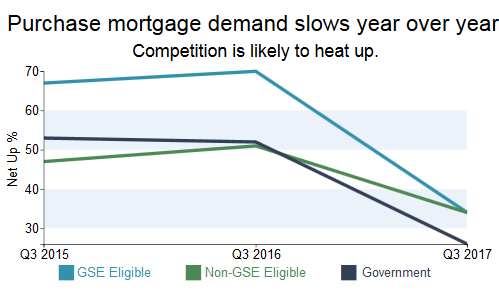
And how are lenders combating this lack of demand and the deteriorating profit margins that are being pressured by competition? They’re loosening lending standards. Fannie Mae’s report: Lenders further eased home mortgage credit standards during the third quarter, continuing a trend that started in late 2016. In particular, both the net share of lenders reporting easing on GSE-eligible loans for the prior three months and the share expecting to ease standards on those loans over the next three months increased to survey highs. Lenders’ comments suggest that competitive pressure and more favorable guidelines for GSE loans have helped to bring about more easing of underwriting standards for those loans. This chart shows the net share of lenders reporting loosening their lending standards for each type of loan (= the share of lenders reporting loosening credit standards minus those reporting tightening standards):
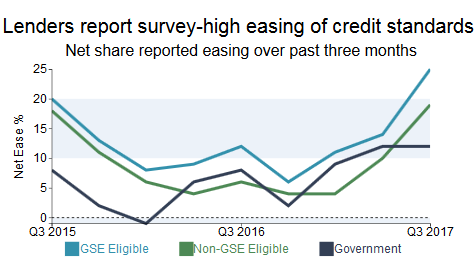
In many urban markets home prices have soared far beyond their peaks during the prior crazy housing bubble. That bubble ended with such spectacular results, in part because lending standards had been loosened so that more people could be stuffed into more homes, and more expensive homes that they couldn’t afford, and whose prices then plunged when the scheme fell apart. This time around, home prices, according to the national Case-Shiller Home Price Index, are now about 5% above the prior crazy bubble peak that imploded with such fanfare:
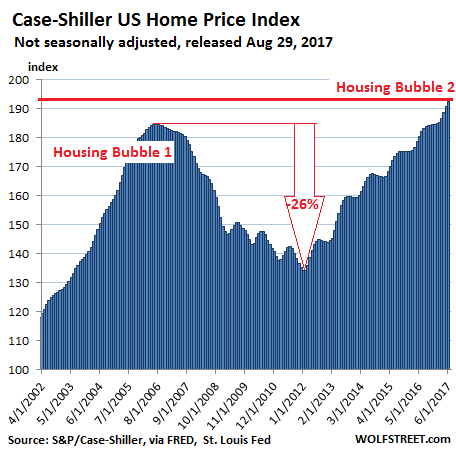

Everything’s a casino now.
• Levered Loan Volumes Soar Past 2007 Levels As “Cov-Lite” Deals Surge (ZH)
If a surge in covenant-lite levered loans is any indication that debt and equity markets are nearing the final stages of their bubbly ascent, then perhaps now is a good time for investors to take their profits and run. As the Wall Street Journal points out this morning, levered loans volumes in the U.S. are once again surging, eclipsing even 2007 levels, despite the complete implosion of bricks-and-mortar retailers and continued warnings that “the market is getting frothy.” Volume for these leveraged loans is up 53% this year in the U.S., putting it on pace to surpass the 2007 record of $534 billion, according to S&P Global Market Intelligence’s LCD unit. n Europe, recent loans offer fewer investor safeguards than in the past. This year, 70% of the region’s new leveraged loans are known as covenant-lite, according to LCD, more than triple the number four years ago.
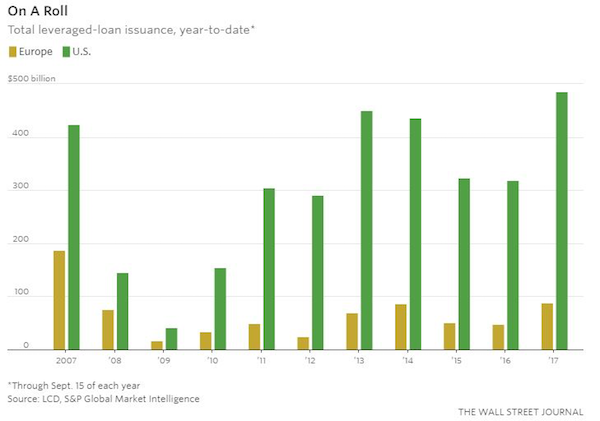
Covenants are the terms in a loan’s contract that offer investor protections, such as provisions on borrowers’ ability to take on more debt or invest in projects. “If feels like the market is getting frothy,” said Henrik Johnsson at Deutsche Bank. “We’re overdue a correction.” Meanwhile, volumes are surging even as traditional lender protections have become basically nonexistent. As S&P LCD points out, over 70% of levered loans issued so far in 2017 are considered “covenant-lite” versus only 30% of those issued in 2007. Before the financial crisis, the boom in leveraged loans was one of the signs of markets overheating. As the crisis intensified in 2008, investors in U.S. leveraged loans lost nearly 30%, according to the S&P/LSTA Leveraged Loan Index.
Regulators are taking note. In its last quarterly report, the Bank for International Settlements noted the growth of covenant-lite loans and pointed out that U.S. companies are more leveraged than at any time since the beginning of the millennium. That could harm the economy in the event of a downturn or a rise in interest rates, said the BIS consortium of central banks.
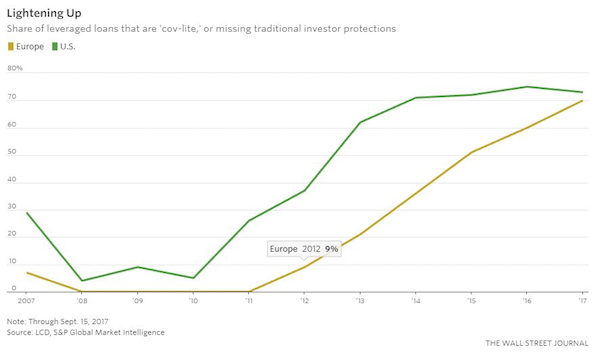

Not quite yet. But they will.
• China’s Crackdown Brings Developers Crashing Back to Earth (BBG)
The world’s most extreme stock rally is getting a reality check. After share price gains at Chinese property developers accelerated at a breathtaking pace in the past month, led by an 87% surge in Sunac, the momentum has started to turn as authorities have taken a harder line on reining in financial risks. Six of the 10 best performers on the MSCI All-Country World Index in the one month through Sept. 21 were Chinese real estate firms. Chinese developers had their biggest slump in six years on Monday, before some rebounded on Tuesday. Record home sales and buoyant earnings helped spur an unprecedented rally this year for Chinese developers, especially large firms positioned to wrest market share through debt-fueled acquisitions.
Top of that list are the nation’s two most indebted developers – China Evergrande Group and Sunac – whose shares swelled 459% and 391% respectively. Some investors were starting to question how long the astonishing share gains could last, even before a raft of housing curbs over the weekend. “The drop of property stocks today brings a reality check,” Andy Wong at Pictet Asset Management said in a briefing Monday. “In the past few months investors have been focusing purely on growth. But it’s never wise to totally ignore the risk of leverage.” Sunac shares have plunged almost 16% from a Sept. 19 high, amid the general pall over the sector and news that a financial firm is scrutinizing its loans to Sunac, China’s most leveraged developer.
Evergrande shares have tumbled more than 12% in the past three trading sessions, matching the decline in a Bloomberg index of 22 mainland developers. Even with the recent selloff, Chinese developers remain among the world’s best-performing stocks this year. Evergrande and Sunac two top stocks in the MSCI All-Country World Index this year. Part of that rally was stoked by a housing market boom that buoyed developers’ earnings in the first half, sending sales soaring and boosting profit margins to the highest levels in three years, according to calculations based on earnings reports.
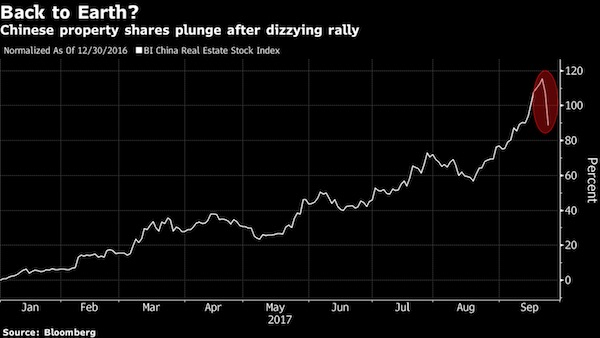

It’s where the excess cash has gone.
• The Next Crisis Will Start in Silicon Valley (BBG)
Since 2007, a tremendous wave of innovation has swept across the financial sector, affecting almost every aspect of finance. New robo-adviser startups like Betterment and Wealthfront have begun dispensing financial advice based on algorithmic calculations, with little to no human input. Crowdfunding firms like Kickstarter and Lending Club have created new ways for companies and individuals to raise money from dispersed networks of individuals. New virtual currencies such as Bitcoin and Ethereum have radically changed our understanding of how money can and should work. These financial technology (or “fintech”) markets are populated by small startup companies, the exact opposite of the large, concentrated Wall Street banks that have for so long dominated finance.
And they have brought great benefits for investors and consumers. By automating decision-making and reducing the costs of transactions, fintech has greased the wheels of finance, making it faster and more efficient. It has also broadened access to capital to new and underserved groups, making finance more democratic than it has ever been. But revolutions often end in destruction. And the fintech revolution has created an environment ripe for instability and disruption. It does so in three ways. First, fintech companies are more vulnerable to rapid, adverse shocks than typical Wall Street banks. Because they’re small and undiversified, they can easily go under when they hit a blip in the market. Consider the case of Tokyo-based Mt. Gox, which was the world’s biggest bitcoin exchange until an apparent security breach took it down in 2014, precipitating losses that would be worth more than $3.5 billion in today’s prices.
Second, fintech companies are more difficult to monitor than conventional financial firms. Because they rely on complex computer algorithms for many of their essential functions, it’s hard for outsiders to get a clear picture of the risks and rewards. And because many of their technologies are so new and innovative, they may fall outside the reach of old and outdated regulatory structures. The recent proliferation of “initial coin offerings,” for example, has left regulators around the world scrambling to figure out how to respond. Third, fintech has not developed the set of unwritten norms and expectations that guide more traditional financial institutions.
In 2008, when Lehman Brothers was teetering on the brink of bankruptcy, the heads of the largest Wall Street investment banks gathered in New York to coordinate their actions and prevent further panic. It’s hard to imagine something like that happening in the fintech world. The industry is so new, and the players so diverse, that companies have little incentive to cooperate for the greater good. Instead, they prioritize aggressive growth and reckless behavior.

If this is not a wake-up call for you…
• King Cash May Reign For Weeks In Storm-Ravaged Puerto Rico (BBG)
In post-hurricane San Juan on Monday, commerce picked up ever so slightly. With a little effort, you could get the basics and sometimes more: diapers, medicine, or even a gourmet hamburger smothered in fried onions and Gorgonzola cheese. But almost impossible to find was a place that accepted credit cards. “Cash only,” said Abraham Lebron, the store manager standing guard at Supermax, a supermarket in San Juan’s Plaza de las Armas. He was in a well-policed area, but admitted feeling like a sitting duck with so many bills on hand. “The system is down, so we can’t process the cards. It’s tough, but one finds a way to make it work.” The cash economy has reigned in Puerto Rico since Hurricane Maria decimated much of the U.S. commonwealth last week, leveling the power grid and wireless towers and transporting the island to a time before plastic existed.
The state of affairs could carry on for weeks or longer in some remote parts of the commonwealth, and that means it could be impossible to trace revenue and enforce tax rules. The situation further frustrates one of the many challenges already facing a government that has sought a form of bankruptcy protection after its debts swelled past $70 billion: boosting revenue by collecting money that slips through the cracks. In fact, the power blackout only exacerbates a situation that has always been, to a degree, a fact of life in Puerto Rico. Outside the island’s tourist hubs, many small businesses simply never took credit cards, with some openly expressing contempt for tax collectors and others claiming it was just a question of not wanting to deal with the technology.
But those were generally vendors of bootleg DVDs, fruit stands, barbers — not major supermarkets. Now, the better part of the economy is in the same boat. Cash was in short supply. Many Puerto Ricans were still living off what money they thought to withdraw ahead of the storm. Most ATMs on the island still weren’t working because of the power outage or because no one had refilled them. In Fajardo, a hard-hit coastal area, the paper printouts taped to sheet metal storm shutters read: “Cash only, thank you.”

Washington has been a casino for decades.
• The White House as Donald Trump’s New Casino (Nomi Prins)
During the 2016 election campaign, Donald Trump repeatedly emphasized that our country was run terribly and needed a businessman at its helm. Upon winning the White House, he insisted that the problem had been solved, adding, “In theory, I could run my business perfectly and then run the country perfectly. There’s never been a case like this.” Sure enough, while Hillary Clinton spent her time excoriating her opponent for not releasing his tax returns, Americans ultimately embraced the candidate who had proudly and openly dodged their exposure. And why not? It’s in the American ethos to disdain “the man” – especially the taxman. In an election turned reality TV show, who could resist watching a larger-than-life conman who had taken money from the government?
Now, give him credit. As president, The Donald has done just what he promised the American people he would do: run the country like he ran his businesses. At one point, he even displayed confusion about distinguishing between them when he said of the United States: “We’re a very powerful company – country.” Of course, as Hillary Clinton rarely bothered to point out, he ran many of them using excess debt, deception, and distraction, while a number of the ones he guided personally (as opposed to just licensing them the use of his name) – including his five Atlantic City casinos, his airline, and a mortgage company – he ran into the ground and then ditched. He escaped relatively unscathed financially, while his investors and countless workers and small businesses to whom he owed money were left holding the bag.
We may never fully know what lurks deep within those tax returns of his, but we already know that they were “creative” in nature. As he likes to put it, not paying taxes “makes me smart.” To complete the analogy Trump made during the election campaign, he’s running the country on the very same instincts he used with those businesses and undoubtedly with just the same sense of self-protectiveness. Take the corporate tax policy he advocates that’s being promoted by his bank-raider turned Treasury secretary, Steve Mnuchin. It’s focused on lowering the tax rate for multinational corporations from 35% to 15%, further aiding the profitability of companies that already routinely squirrel away profits and hide losses in the crevices of tax havens far removed from public disclosure.

People are being left behind everywhere.
• Large Parts Of America Are Being Left Behind (ZH)
Economic prosperity is concentrated in America’s elite zip codes, but in an interesting report on Distressed Communities, from The Economic Innovation Group, it is increasingly clear that economic stability outside of those communities is rapidly deteriorating. As Axios noted, this isn’t a Republican or Democratic problem. At every level of government, both parties represent distressed areas. But the economic fortunes of the haves and have-nots have only helped to widen the political chasm between them, and it has yet to be addressed by substantial policy proposals on either side of the aisle.
Economic Prosperity Quintiles
As MishTalk.com’s Mike Shedlock writes below, the study notes: “America’s elite zip codes are home to a spectacular degree of growth and prosperity. However, millions of Americans are stuck in places where what little economic stability exists is quickly eroding beneath their feet.” Distress is based on an evaluation of seven metrics.
• No high school diploma
• Housing vacancy rate
• Adults not working
• Poverty rate
• Median income ratio
• Change in employment
• Change in business establishmentsChange in Distress Quintiles
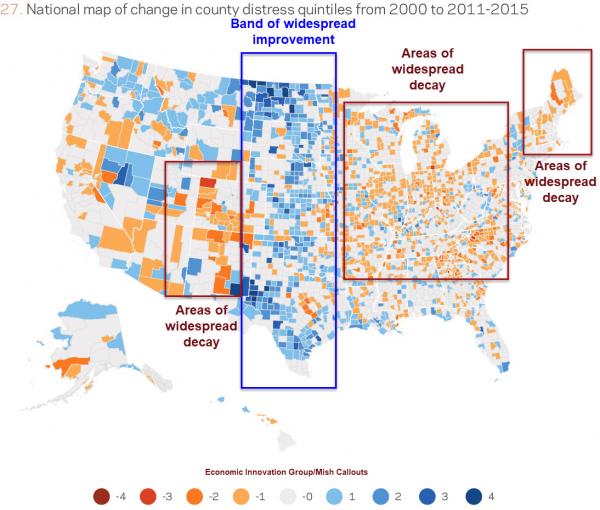

Merkel acts like an empress.
• ‘A Lot Of People Feel Left Behind’ – Why Far Right Won In Germany (G.)
Despite gains made by the far-right Alternative für Deutschland (AfD), the breaking up of the ‘grand coalition’ could mark a positive step for Germany, according to voters who responded to our online callout. Here voters in Germany tell us why they think the AfD made gains, and what hopes they have for the future of the country’s politics.
‘A lot of people feel left behind’ – Sarah, 37, teacher, Bonn My second vote was a tactical one. I gave it to the Linke. I knew that we’ll need a very strong voice against the AfD. I am pleased though, that the SPD decided to go into opposition to redefine themselves. A lot of people feel left behind. They are looking for scapegoats. It is the easy way to deal with problems. The AFD makes use of this feeling. With the grand coalition, there was no real debating culture left. The CDU went too much into the middle, leaving the right out. Just like the SPD under Schröder left the left-wing out.
The impact of the newly arrived is big. Some people are scared. Some that have been living in Germany for a long time feel disadvantaged. We can live together and be united in our diversity. I see this in school every day. If we treat each other with respect, then we do not need to fear. It is a long and strenuous way. But it is also very rewarding and fun to walk down that lane. At dinner I really had to get hold of myself to not cry in front of my children. I physically felt sick. A Nazi party being the third biggest party in Germany! I am still devastated.

More Europe is dead.
• Macron Presses Ahead With His Vision for Europe As Merkel Calls For Calm (BBG)
German Chancellor Angela Merkel already faces complex coalition negotiations with at least three other parties. Now French President Emmanuel Macron wants in on the act. In a speech at the Sorbonne in Paris on Tuesday, Macron will make proposals for re-shaping Europe that he acknowledges will require Merkel’s support to push through. While he isn’t seeking to interfere in German domestic politics, it makes sense to air the ideas before a coalition is formed rather than after, an official in his office told reporters. Macron needs Germany’s backing for planned overhauls of areas ranging from defense and immigration to the economy. Yet with Merkel weakened in Germany’s vote and her potential Free Democratic coalition partner even more hostile to aspects of euro-area integration than her own party, the prospect of radical change in Europe looks to have diminished.
“There was this expectation that the election would strengthen the German-French alliance, all kinds of reforms would be tackled and then we’re on the road to fiscal union,” Oliver Adler, head of economic research at Credit Suisse in Zurich, said in an interview. “This now seems politically very unlikely.” Macron will press ahead with his vision of remaking European institutions anyway, seeking to set the direction of debate. While a key element of his reform package is intended to reinforce the euro against future shocks, his speech won’t be all about the single currency area. Macron will propose as many as 10 projects in his speech, including a European agency for innovation and a system to improve start-up funding, a larger Erasmus student-exchange project, increased anti-terrorism cooperation, and a “digital plan” that includes a joint effort to push the EU Commission for a plan to tax Internet giants such as Apple and Google.
The goal is to have a roadmap in place by the summer of 2018 that will equip the EU for its next decade, according to the French official. Macron intends to discuss his plans with fellow EU leaders at a summit in the Estonian capital Tallinn at the end of this week. He may struggle to engage Merkel after Martin Schulz, her Social Democratic election challenger, upset her own plans by announcing his intention not to renew their respective parties’ coalition of the past four years.

Politicians don’t understand technology.
• EU Presidency Calls For Massive Internet Filtering (EDRi)
A Council of the European Union document leaked by Statewatch on 30 August reveals that during the summer months, that Estonia (current EU Presidency) has been pushing the other Member States to strengthen indiscriminate internet surveillance, and to follow in the footsteps of China regarding online censorship. Standing firmly behind its belief that filtering the uploads is the way to go, the Presidency has worked hard in order to make the proposal for the new copyright Directive even more harmful than the Commission’s original proposal, and pushing it further into the realms of illegality. According to the leaked document, the text suggests two options for each of the two most controversial proposals: the so-called “link tax” or ancillary copyright and the upload filter. Regarding the upload filter, the text offers two alternatives:
Option A maintains the Commission’s original proposal of having in place an upload filter which will be under the control of platforms and other companies that are hosting online content. Although it removes mentions to “content recognition technologies”, in reality, there is no way to “prevent the availability” (another expression which remains in the text) of certain content without scanning all the content first. Option B is, at best, a more extreme version of Option A. In fact, it seems so extreme that it almost makes the first option look like a reasonable compromise. This may, of course, be the “diplomatic” strategy. In this extreme option, the text attacks again the liability regime of the e-commerce Directive – which, bizarrely, would not be repealed, leaving us with two contradictory pieces of EU law but adds a “clarification” of what constitutes a “communication to the public”.
This clarification establishes that platforms (and its users) would be liable for the copyright infringing content uploaded by its users. The proposals in this leak highlight a very dangerous roadmap for the EU Member States, if they were to follow the Presidency’s lead. The consequences of these flawed proposals can only be prevented if civil society and EU citizens firmly raise their voices against having a censorship machine in the EU. We will be turning on our call tool at savethememe.net before each of the key votes in the European Parliament. Make use of the tool, and call your representatives to stop the #censorshipmachine!

Oh, get real: “a recognition of the tremendous efforts and sacrifices the Greek people have made to restore stability to their country’s public finances.”
• EU Officially Ends Excessive Deficit Procedure Against Greece (R.)
European Union states decided on Monday to close disciplinary procedures against Greece over its excessive deficit after improvements in Greece’s fiscal position, confirming the country’s recovery is on the right track. The move, although largely symbolic, sends a new signal that Greece’s public finances are again under control, facilitating the country’s plans to tap markets after a successful issue of bonds in July which ended a three-year exile. EU fiscal rules oblige member states to keep their budget deficits below 3% of their economic output or face sanctions that could entail hefty fines, although so far no country has received a financial penalty.
Greece had a 0.7% budget surplus in 2016, and is projected to maintain its fiscal position within EU rules’ limits this year. “In the light of this, the Council (of EU states) found that Greece fulfils the conditions for closing the excessive deficit procedure,” the EU said in a note. “After many years of severe difficulties, Greece’s finances are in much better shape. Today’s decision is therefore welcome”, Estonia’s finance minister Toomas Toniste said. The EU states’ decision confirmed a proposal by the EU executive commission in July to end the disciplinary procedure for Greece. The economics commissioner Pierre Moscovici said the decision was “a recognition of the tremendous efforts and sacrifices the Greek people have made to restore stability to their country’s public finances.”

Good cop bad cop. Rinse and repeat.
• ECB May Frontload 2018 Bank Stress Tests With View To Greece – Draghi (R.)
The ECB may ‘frontload’ its bank stress test next year, ECB President Mario Draghi said on Monday, when asked if supervisors plan any early checks on the health of Greek lenders. The IMF has been pushing for a fresh asset quality review at Greek banks, possibly as part of an bailout review that is slated to start soon. The ECB has rejected the call, saying that the next check is the regular 2018 stress test, but Draghi’s words suggest that ECB may be somewhat flexible with its timeline. “The SSM (Single Supervisory Mechanism) will take its decision with full independence,” Draghi told members of the European Parliament. “And what the SSM plans to do next year is to have a stress test, possibly frontloading the stress test, and basically the SSM sent a letter to the IMF concerning exactly this expected line of action,” Draghi said.

Maybe Macron can do some good too.
• French Government Declares War On Pesticides (AFP)
France is planning to cut back on use of all pesticides, the government said Monday, though it rowed back on an announcement of an outright ban on controversial chemical glyphosate. Government spokesman Christophe Castaner had said earlier Monday that France – Europe’s biggest food producer a- intended to phase out glyphosate completely by 2022 over fears that it may cause cancer. But he later reversed his comments, saying that by the end of President Emmanuel Macron’s five-year term “the government is committed to seeing significant progress on all pesticides”. Glyphosate is the active ingredient in one of the world’s most widely used weedkillers, Roundup, produced by the US agro-chemicals giant Monsanto. The European Commission has proposed extending the licence for the use of the chemical for 10 years, which France has said it will vote against and try to block.
France’s biggest farming union, the FNSEA, said Monday that it was “out of the question” for the country to go it alone, worrying that a French ban could put them at a disadvantage against European competitors. “A sudden ban, no — a path for reducing it and finding solutions, if the solutions are good economically and technically, we can see it happening,” said FNSEA chief Christiane Lambert. Europe limited use of glyphosate last year pending further research. The EU’s chemical agency said glyphosate should be not be classified as cancer-causing. But this is challenged by scientists and environmentalists who point to a finding by the International Agency for Research on Cancer that glyphosate is “probably carcinogenic”. Some 1.3 million people have signed an online petition calling for a ban on the chemical.
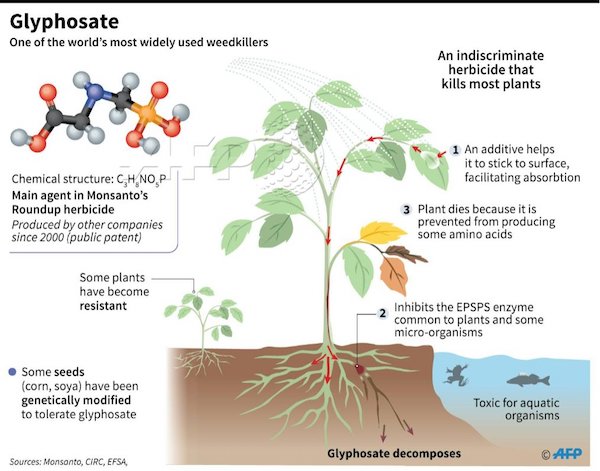

Can mankind rid the earth of its presence? Stay tuned.
• Our Food Crops Face Mass Extinction Too (G.)
A “sixth mass extinction” is already under way, scientists are now warning us. Species such as the Bengal tiger and blue whale are vanishing at an alarming rate, and mournful eulogies are being written on how those born in 20 years’ time may never see an African elephant. But who is writing the eulogy for our food? Huge proportions of the plant and animal species that form the foundation of our food supply -known as agrobiodiversity- are just as endangered and are getting almost no attention. Take some consumer favourites: chips, chocolate and coffee. Up to 22% of wild potato species are predicted to become extinct by 2055 due to climate change. In Ghana and Ivory Coast, where the raw ingredient for 70% of our chocolate is grown, cacao trees will not be able to survive as temperatures rise by two degrees over the next 40 years. Coffee yields in Tanzania have dropped 50% since 1960.
These crops are the tip of the iceberg. Across the world, 940 cultivated species are threatened. Agrobiodiversity is a precious resource that we are losing, and yet it can also help solve or mitigate many challenges the world is facing. It has a critical yet overlooked role in helping us improve global nutrition, reduce our impact on the environment and adapt to climate change. According to the World Health Organisation, poor diet is the biggest cause of early death and disability. Globally, 2 billion people are undernourished, while 2 billion are obese and at risk of contracting diabetes, heart disease and cancer. Focusing on large-scale intensive production of starchy crops for calories rather than nutritious diets has led to serious levels of obesity around the world, from the US to Kenya. Our agrobiodiversity base can be a source of affordable, nutritious food – provided we don’t let it disappear.
[..] About 33% of the world’s farmland is estimated to be degraded, lacking the nutrients essential for growing crops. Agrobiodiversity once again has a solution. Planting cold-tolerant legumes and forages throughout winter has helped farmers in France naturally reduce weed infestation as well as increasing soil’s nutrient content and capacity to hold water. Natural remedies such as this can enhance the sustainability of farms worldwide, reducing the sector’s impact on the environment.

“Three-quarters of the world’s food today comes from just 12 crops and five animal species”. In India, there used to be 100,000 varieties of rice. Today, there’s a big struggle going on to preserve a few dozen. There are many different banana species, but we all eat just one, the Cavendish. Which is under severe threat from a global fungus and could be gone in 5-10 years.
• Sixth Mass Extinction Of Wildlife Also Threatens Global Food Supplies (G.)
The sixth mass extinction of global wildlife already under way is seriously threatening the world’s food supplies, according to experts. “Huge proportions of the plant and animal species that form the foundation of our food supply are just as endangered [as wildlife] and are getting almost no attention,” said Ann Tutwiler, director general of Bioversity International, a research group that published a new report on Tuesday. “If there is one thing we cannot allow to become extinct, it is the species that provide the food that sustains each and every one of the seven billion people on our planet,” she said in an article for the Guardian. “This ‘agrobiodiversity’ is a precious resource that we are losing, and yet it can also help solve or mitigate many challenges the world is facing. It has a critical yet overlooked role in helping us improve global nutrition, reduce our impact on the environment and adapt to climate change.”
Three-quarters of the world’s food today comes from just 12 crops and five animal species and this leaves supplies very vulnerable to disease and pests that can sweep through large areas of monocultures, as happened in the Irish potato famine when a million people starved to death. Reliance on only a few strains also means the world’s fast changing climate will cut yields just as the demand from a growing global population is rising. There are tens of thousands of wild or rarely cultivated species that could provide a richly varied range of nutritious foods, resistant to disease and tolerant of the changing environment. But the destruction of wild areas, pollution and overhunting has started a mass extinction of species on Earth.
The focus to date has been on wild animals – half of which have been lost in the last 40 years – but the new report reveals that the same pressures are endangering humanity’s food supply, with at least 1,000 cultivated species already endangered. Tutwiler said saving the world’s agrobiodiversity is also vital in tackling the number one cause of human death and disability in the world – poor diet, which includes both too much and too little food. “We are not winning the battle against obesity and undernutrition,” she said. “Poor diets are in large part because we have very unified diets based on a narrow set of commodities and we are not consuming enough diversity.”


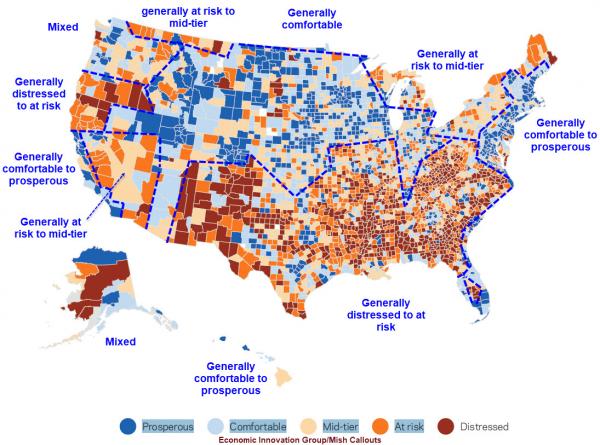







Home › Forums › Debt Rattle September 26 2017